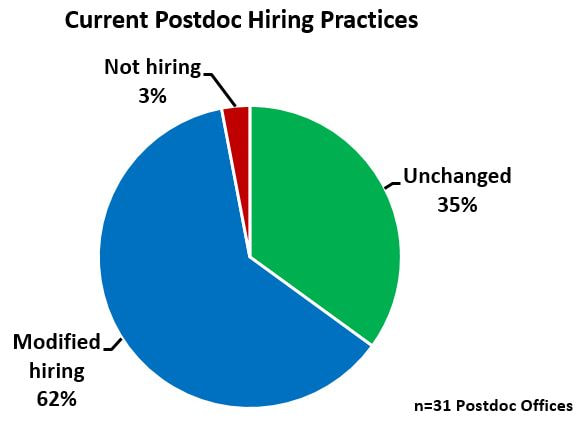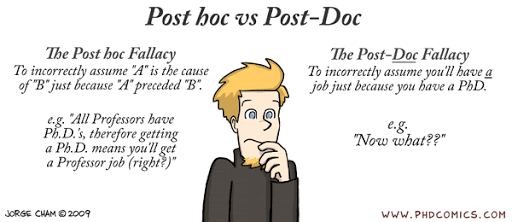NEW Perspectives, Comments, & Insights
Part of a series revisiting my NIH BEST Blog pieces.
Recently, I came across a passage in the book Educated: A Memoir by Tara Westover that I think perfectly captures the nature of finding one’s place in the world. When talking about all the decisions that go into making a life, Westover makes the following analogy:
“Decided. Choices (that people make, together and on their own), numberless as grains of sand, had layered, compressed, coalescing into sediment, then into rock, until all was set in stone.”
Truly, the choices we make throughout our life ultimately shape and define us. Some choices may seem small and trivial (grains of sand) but they compound over time. The choice to pursue a postdoc is certainly not a trivial one but some of the experiences that accompany it can add up to have an impact on one’s career trajectory, often in unexpected ways.
The most pressing decision for the majority of late-stage graduate students is whether to pursue postdoctoral training. Long the default for those Ph.D.s interested in faculty careers in academia, the postdoctoral fellowship, especially in the sciences has become ubiquitous and a virtually expected next step after graduate school. According to NSF data, ~61% of US life science Ph.D.s with post graduation commitments are pursuing a postdoc and ~38% of all Ph.D. recipients surveyed pursue a postdoc. Even for graduate students interested in careers in industry, many are told that employers want to see postdoctoral experience before offering them a job. Nevertheless, graduate students should definitely consider the value of a postdoc to their own career goals before committing to a few (or often more) years of training.
| As the COVID-19 pandemic has resulted in an unstable labor market (including in academia), now may be an excellent time for Ph.D.s to spend a few years in a postdoc to strengthen their skills as they wait for economic conditions to improve. Postdocs will, at least for the foreseeable future, be needed to help drive scientific research and innovation at US universities. In fact, data on postdoctoral hiring trends collected in May/June 2020 by the Professional Development and Career Office at Johns Hopkins School of Medicine found 35% of responding institutions have not changed their postdoc hiring practices at all post-COVID-19 and only 3% have stopped hiring postdocs completely. |
If you love doing research, a postdoc can seem like a great thing as there are no longer pesky classes and dissertation committee meetings that go along with being a Ph.D. student. Rather, a research postdoc is all about the science. However, there are clear short-term financial costs to pursuing a postdoc as a well-publicized 2017 study found, estimating that 15 years into their careers, former postdoc researchers earned a total salary ~20% less than non-postdocs across a variety of sectors (non-tenure track academic research, government/nonprofit, industry). While this number is somewhat depressing, I am about to use a cliché but one I whole-heartedly believe in when it comes to the postdoctoral experience: it’s not all about the money.
| Use Your Time as Postdoc to Build Skills & Expand Your Career Options I realize my perspective as a mobile, single, relatively young man is different than many others. To summarize my personal experience on the matter, I have found my 4.5 years as a postdoc to be a great experience that helped me grow as a person. During this time I have done cool science that will hopefully have an impact on human health, learned a variety of new techniques and skills (both “hard/technical” and “soft/transferable”; including leadership skills in the Vanderbilt Postdoctoral Association), and discovered more about what I desire for my life. |
Furthermore, and while it will vary from lab to lab, I have to say that my postdoctoral experience has also given me the ability to live a flexible life. I can take a few weeks off between Christmas and New Years to visit with my parents and sisters, take a week off in the summer to go to the beach with family and friends, or take a Friday off to get a jumpstart on a weekend trip. As long as one's work gets done, a good postdoc advisor won't micromanage your working hours. Thus, a postdoc can offer a good deal of autonomy and flexibility, albeit compensating you at a lower rate than the market might allow. Importantly, postdoc compensation is improving, as measured by NIH NRSA postdoc stipend levels.
In these challenging times, you can still use your postdoc time to up-skill via the vast number of courses offered online via LinkedIn Learning, Coursera, EdX, Udemy, and more.
| Moving to Your Preferred Geographic Area for the Postdoc One should consider taking a postdoc in a geographic area where you believe career opportunities in your desired field are plentiful. That might be the Bay Area, San Diego, Boston, New York, or lesser known but dynamically growing Southern metro areas such as Austin and Raleigh-Durham. CBRE, a world leader in real estate services, has some excellent data on leading US life science clusters and top tech talent markets in North America. |
Finally, living in your desired geographic area as a postdoc will allow you to rapidly act on job market opportunities. If a position opens up and they want you to start in a few weeks, you will already have made the move and will be ready to hit the ground running in your new position.
Obviously, a postdoc should eventually come to an end and I think one shouldn’t stay too long in a postdoc. What "too long" is will vary by field but I would argue that if you don't feel like you are building new skills and growing as a researcher, you should start planning to transition out of the postdoc. It is easy to get complacent but the postdoc position should be a temporary “stepping stone” to bigger and better things.
Since January 2019, I work in postdoc affairs at NC State University (read some about that journey here). In this role, I help postdocs think strategically about the next step in their careers. In a way, I have come full circle from my postdoc perspective this post as I am able to reflect on my own experience as a postdoc to help others during this time in their lives.
Career Conversations for Researchers in the Age of COVID-19 from UCSF's Office of Career & Professional Development
The National Postdoctoral Association (NPA) has laid out 6 core competencies around effective postdoctoral training:
1. Discipline-specific conceptual knowledge
2. Research skill development
3. Communication skills
4. Professionalism
5. Leadership and management skills
6. Responsible conduct of research
NPA Postdoc Career Resources
Postdoc Academy Resources, including those around succeeding as a postdoc
More from the Reflections Blog:
NIH BEST Blog Rewind: Pondering the "next step" as a late-stage postdoctoral fellow
Career Exploration 101
Post Ph.D.-Career Plans: Consider the Possibilities
The End of Work as We Know It: How an increasingly automated world will change everything
Why you should get involved in things outside the lab/work








 RSS Feed
RSS Feed